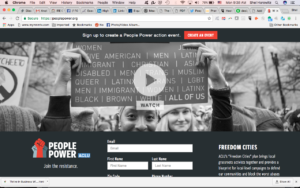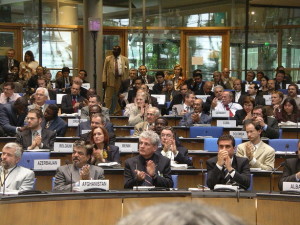ACLU Turns Activist: Notes From a Training Livestreamed to 200,000 People
With a full auditorium in Miami, and 2000 livestream sites reaching 200,000 people (according to ACLU’s Executive Director, Anthony Romero, who opened the March 11 session), the American Civil Liberties Union moved beyond the courtroom and into community organizing. While ACLU lawyers have often been present (and advising) at actions in the streets, I personally don’t remember a time when the group—founded in 1919 in resistance to the notorious Palmer Raids, rounding up activists at the behest of the Attorney General of the time—actively worked to create a mass movement of resistance.
While it also covered the Republicans’ proposed replacement for Obamacare and attacks on Planned Parenthood, The training—really, more of a presentation, other than Lee Rowland’s remarks—focused largely on the administration’s attacks on Muslims and immigrants and ACLU’s Freedom Cities initiative developed in response—working to gain local law enforcement officials to adopt a nine-point platform of non-cooperation with federal ICE anti-immigration actions.
Following are the notes I took. I didn’t take notes for the first couple of speakers, which included Romero, ACLU National Political Director Faiz Shakir, and I believe there may have been one other.

Lee Rowland, Senior Staff Attorney: Your Rights in Protesting
We will stick up for controversial, even abhorrent points of view. We believe none of us should be silenced. There are people who think Black Lives Matter is a terrorist organization.
Public forum spaces: streets, sidewalks, parks—you have the right to protest. But in the street, you do not have the right to block traffic unless you have a permit specifying that. A permit gives you a bunch more rights, and you can work with government to work out a parade route, use amplification.
1/21/17 was the single largest day of protest in American history. Let’s give that a run for its money!
The sidewalks outside Trump Tower have become a very popular place. Sidewalk protests are automatically legal as long as you don’t block access to doorways.
Parks. You can sing, pray, dance. But each park has a trigger number for attendees. Exceeding that number requires a permit. Know that number. Breaking news is an exception. Spontaneous protests in response are not restricted by number.
Other government property that aren’t designed as public spaces. The general rule is that the government has more ability to shut you down if they can argue that your presence is disruptive. Airports can stop you from disrupting but not from expressing speech (including sign holding). The farther from the core of facility’s purpose, the more rights. So you won’t have a lot of rights at the departure gate, but maybe at arrivals…or outside. [Editor’s note: I participated in protesting the immigration ban at Bradley (Hartford) Airport just after the first Executive Order banning travel from seven Muslim-majority nations. We had about 3000 people in the baggage claim area.] If you’re organizing at an airport, get a liaison from the airport staff if you can.
Congressional Town Halls. They can’t shut down buttons, small signs. They can regulate the size but not the content.
The government can’t censor you just because it disagrees with your opinion.
But these high-fallutin’ rights on paper don’t always translate to the streets.
Watch your surroundings. Being armed with your rights empowers you. You can yell to demonstrators being arrested about their rights including right to remain silent and to refuse a search. You have the right to photo/video anything in public view. Officers will lie, but make notes and tell the ACLU.
We as Americans have to go out and grab that moral arc and turn it toward justice.
Louise Milling, Deputy Director
Health Care: Affordable Care Act is the most significant civil rights/civil liberties legislation in this century. It has saved and changed people’s lives. 20 million were lifted out of the ranks of uninsured. It bars discrimination on preexisting, gender, transgender. Gave us no-cost birth control. More services for people with disability. To live out the civil right of not being in an institution.
The Republican replacement bill attacks the structure, the financing. It kicks the legs out from underneath of the stool. American Medical Association, AARP, hospitals have come out against it. This bill jeopardizes millions of us and the people we care about. We’re going to step up for this one.
Planned Parenthood: This bill says Planned Parenthood can’t be part of the Medicaid program. And that people on Medicaid can no longer go to Planned Parenthood for cancer screening, birth control. 1 of 5 women turn to Planned Parenthood for health care at some part of their lives. Planned Parenthood is targeted because Planned Parenthood provides abortions. But not through the Medicaid program. Their vision is that Planned Parenthood should be stripped of participation in Medicaid because it provides a constitutionally protected service that allows women to protect our lives. Is that what decency looks like?
Medicaid: It’s an entitlement program. The federal government promises it will contribute money to pay for the services it covers. It’s going to take care of you. This bill would be a radical transformation. It says we are going to cap the money we will give toward any particular person. That means fewer dollars, fewer services for the most vulnerable, for the most essential thing—our health. The harm will be felt most acutely by people with disabilities. Medicare provides payment for support to go to work and live independently.
This was unveiled on Monday. By Wednesday it was already in committee for markup. They want it for a full vote in March and on the president’s desk n April. Less than two months for a program that would deny health coverage for millions? To totally radically restructure a program that’s been in place for six decades?
We saw four senators change their responses (AK, OH, CO, one other). We need you to tell your reps why this matters, the values that motivate you to come forward. It matters to the members of Congress, to the woman on Medicaid who goes to Planned Parenthood, to the man in a wheelchair who is able to go to work, to the rural woman who’s able to get insurance. This is for the people, by the people. I’m asking you to pledge to come together and stand up in the name of decency, care, dignity, fairness for all. Game on!
Andre Segura, staff attorney in national office
Trump administration is launching an assault on immigrants and people of color. In his first week, he released really bad Eos (executive orders), calling for the border wall, more ICE agents, and the Muslim ban. This hit home. We are immigrants and children of immigrants, people of color, of different faiths, with accents. That’s what makes our country great and we’re seeing this assault. I think of my two boys. Are they going to be called racist names? My parents with their beautiful Columbian-American accents?
3 Issues
- Muslim ban. Friday afternoon after he took office, and there was immediate chaos. ACLU and partners worked overnight to challenge that. We filed at 5 a.m. the next morning. We filed to put a stop to that order. I drove to JFK in the morning. There was a small but loud protest, and a dozen attorneys inside. Over the next few hours, more and more attorneys came. And I looked out the window and saw a sea of protestors. And that’s what became the story. Regular people came out and said this is not the country I want to live in and I’m going to go protest. We now have the second ban. Trump rescinded that first ban after numerous lawsuits. But the second one suffers from the same flaws and it needs to fail. We need you to come out and voice your support.
- President Trump is trying to bully cities and states to become part of his deportation force, by threatening to withdraw their funding. So this means when a police officer pulls someone over or knocks on a door, they have to think, is there some issue with their immigration status. This is damaging to local law enforcement. We need to stand up so people don’t fear going to the police to report crimes. All the best law enforcement departments are saying this. We are bringing criminal charges against Joe Arpayo [extreme right-wing/anti-immigrant former sheriff in Arizona]. The lesson is that when local law enforcement takes immigration into their own hands, you will see more profiling and more discrimination. So we’re asking you to push more cities not to roll over and give up good policies. We need to demand that they protect our immigrant neighbors.
- Immigration/deportation raids. ICE comes in wearing helmets and bullet-proof vests, it’s like a military operation. Trump wants to add 10,000 ICE agents to the 5-6000 already there. They will not be accountable or transparent. You will not know what they are up to in your town. But we’ve seen excessive force, guns drawn, children scared. Trump is saying we’re going after only the most violent. But we’ve seen the reality. It’s parents, Dreamers [undocumented people brought to the US at a very young age], domestic violence victims. People are being questioned coming off domestic flights. We have to stop it.
We can do some things. We have know-your-rights materials if ICE shows up at your door. They need to have a judicial warrant. Otherwise, don’t open the door. Get out and educate people about their rights. We do not want you engaging with ICE and their raids. If you hear of a raid, go out, document, film it. We need that information.
Padma Laxmi, immigrant from age 4
Joined her mother two years after her mother arrived in America in search for a better future, with $100 in her pocket. “She sculpted the mist, willing a life into existence. And I love this country for allowing that to be possible. America has shaped our dreams, values, and insecurities for three generations. There is no story of ours that is disconnected from the American story. But lately I’ve begun to feel like an outsider.” I grew up in NYC, our neighbors were Peruvian and Filipino, doctors and cab drivers. Seeing all those faces from around the world is what kept me from feeling I didn’t belong. Through my work on Top Chef, I’ve met people from all over America, meeting people in Charleston, New Orleans, Miami. What makes these cities great is the diversity of the people living in them—and that makes the food delicious. I am so grateful I ended up here. And that I can pay it forward by mentoring and employing other young women and starting a health foundation.
What makes America great is our culture of inclusion. We all are a superpower because we’ve managed to create the best of each immigrant culture and create our own uniquely American culture. For all its faults and felonies, our country has been, until now, admired world over. We’re squandering that good will and reputation globally and here and home. What happened to ‘give me your tired, your poor, your huddled masses’? I am standing here in defense of liberty, freedom, and true equality.
My mom came here in the ’70s inspired by the feminist movement. She wanted a better life for me than she had, equal opportunity. Today, we have a state of emergency. Rights and freedoms we’ve taken for granted are being eroded daily. I am alarmed by the rising hatred and violence. But even before, I’ve been horrified by images of black and Latino boys being bludgeoned to death by the very system we were told would protect us. Our system is two systems: one for the white establishment, and one for those unlucky enough to be born brown, gay, trans… I want my daughter Krishna to live in a country governed not by fear but by compassion.
I didn’t see my mother for two whole years. I know that pain of separation. Tearing undocumented parents from their children doesn’t help anyone. Giving refuge to a Syrian family teaches the very American principles of empathy and tolerance.
I don’t have to be Muslim or Mexican to be offended. We should all be offended. We shouldn’t have to walk in someone else’s shows to see that those shoes hurt terribly. This January at the Women’s March, I protested for the very first time. I was holding my little girl’s hand, she’s 6. It felt wonderful. I realized we are all powerful and we must exercise our power now. There’s a sign in the NYC subway, ‘if you see something, say something.’ I’m saying something now—to all of you. Providing shelter to refugees in need is not a partisan issue. It is a human rights issues. Letting folks use what ever bathroom they want, as we do in our own home, is just common decency.
I watch Krishna play with her African American friend Cassius. She’s biracial and can pass for white. When our kids, a few years from now, go to the store for butter, they will surely be treated differently. That’s not right. They are equal in the sandbox. Shouldn’t our policies reflect this too? Now is not the time to close our eyes and think ‘this, too, shall pass.’ We must do more than march. We must consistently resist discrimination of any kind. We must not tolerate the intolerance. To do nothing is a crime against our nation. We owe it to those suffragettes, those who refused to sit at the back of the bus, to our fallen soldiers to preserve what they fought so hard to defend.
Democracy isn’t a static thing. It’s an ever-evolving organism and we must not let it or ourselves devolve. Yes, we are brown. And we too are American And yes, we are Muslim, Hindus, Jews. That Sikh father shot in his own driveway, he was American too. And over half of us are women, and we deserve equal pay. And the right to choose what we want to do with our own bodies. We too are the United States of America. Let’s remember that first word in our country’s name. Let’s not forget who we are.
Faiz Shakir
ACLU’s National Political Director came back on stage for a quick recap of the action plan:
- Request a meeting with local law enforcement officials, put it on PeoplePower.org. Some of them just need a pat on the back and great job. Some need more persuasion.
- Let’s live our values.




